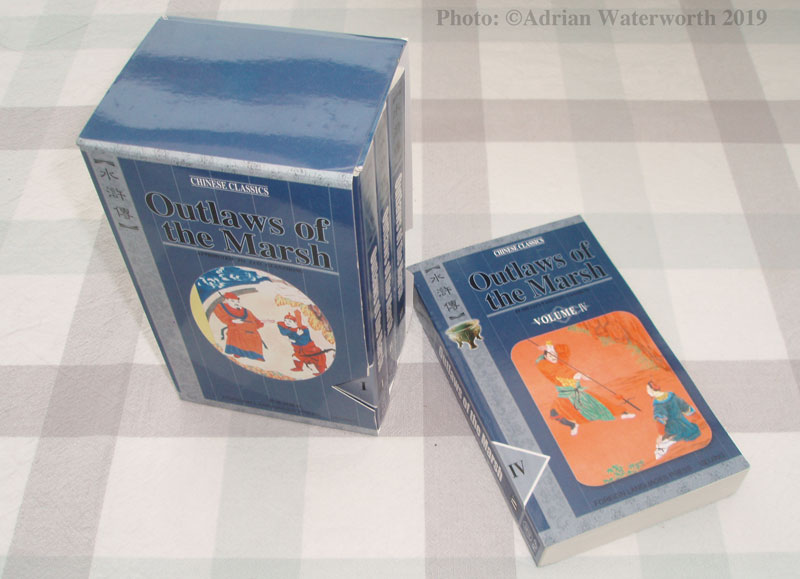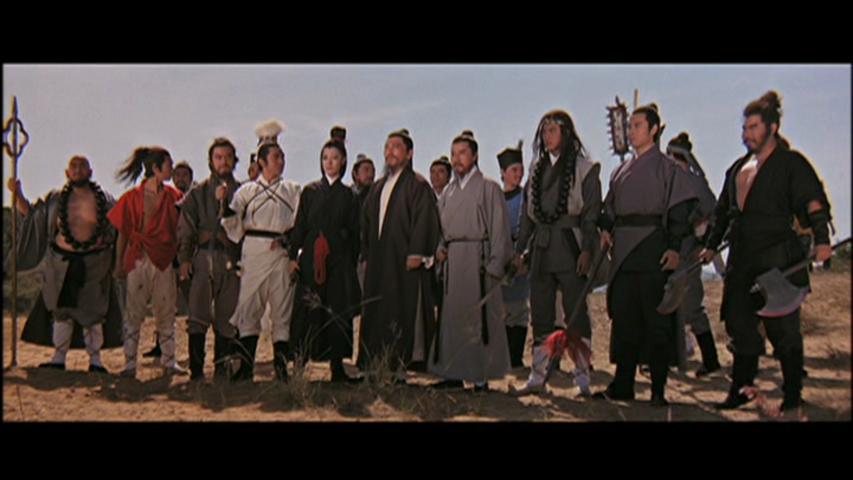Those of you of a certain age may remember a TV series shown on the BBC back in the 70s called “The Water Margin”. This was a Japanese production of a Chinese tale about bandits living in the marsh regions around Mount Liang (or Liang Shan Po as it was usually named in the series). It only ran for a couple of seasons, but was rather fun in its way and full of noble warriors engaged in various forms of mediaeval chop-socky, defeating the bad guys and pausing now and again to stare moodily into the distance. Or moodily at one another if the script called for it.
Although it was made in Japan, it was dubbed into English and featured Burt Kwouk as its occasional narrator. His role largely consisted of providing some background to events, as well as offering up the odd mystical and suitably inscrutable-sounding Oriental proverb. Some of which sounded like they were probably found in a box of fortune cookies, but I digress…
The important point about The Water Margin – aside from the harmless entertainment that it offered a pre-teen Adrian back in a simpler time – is that it is actually based on one of the great classics of Chinese literature. Also known as The Outlaws of the Marsh, it was written around the 14th Century, but is set a couple of centuries earlier during the Song Dynasty. It tells the story of 108 heroes who, faced with widespread petty corruption and the misdeeds of Government and military officials at various levels, end up as outlaws and ultimately all make their way to the marshy region around Mount Liang. From the great bandit encampment that they establish there, they go on to make life miserable for the corrupt officials and generals and other assorted petty bad guys, while sticking to their principles of not attacking the common people or (as far as possible) making the lot of the common folk any worse that it already was.

All in all, it’s a bit of a Robin Hood sort of tale – noble men (and women) forced to become outlaws in a time of corrupt officialdom, while trying to stick up for the ordinary folk (mostly) and behave with honour, etc. etc. Of course, there are some notable differences:
- Whereas even the longest version of the Robin Hood story is still fairly short, the full version of Outlaws of the Marsh is long. Like 100 chapters, over 2000 pages (in the translation I have here), usually published as a four-volume-set sort of long.
- While the cast of major characters in Robin Hood is pretty small, the cast of characters in Outlaws of the Marsh is huge. Just keeping track of the 108 heroes (the 36 “Heavenly Spirits” and the 72 “Earthly Demons” as they’re known), their origins, inter-relationships, roles and positions within Liangshan Marsh can be tricky enough. Add to that the assorted bad guys, secondary characters and other people who crop up in the story and even the shortest summary of who is who is going to take several pages.
- Although Robin Hood and his merry men were styled as outlaws, they were largely noble and didn’t actually do too many criminal sort of things or act in a cruel or vicious manner. The heroes of Outlaws of the Marsh, however, aren’t above a bit of straightforward banditry (when called for) and they’re quite prepared to get seriously vindictive, violent and downright nasty when circumstances call for it. Cutting out the occasional heart, sexual assault, the odd bit of cannibalism and beheading people then stringing their innards up on a tree are par for the course in 12th-14th Century China it seems. Even if you’re the good guys.
There are, of course, similarities too. Just as Robin and his men had Sherwood Forest nicely sewn up and could hide there and harry the Sheriff of Nottingham and his men at will, the Outlaws of the Marsh have a fine stronghold on Mount Liang and can strike out for miles around to bring death and destruction to dodgy officials, evil generals and bad governers alike. Also, just as Robin and his men are ultimately pardoned by King Richard, the Outlaws of the Marsh want nothing more than a pardon and amnesty from the Emperor (which they finally receive in the later part of the story).
So, bearing these points in mind, what’s it like as a book? Well, sadly I don’t have the know-how to read it in the original Chinese, but the translation by Sidney Shapiro is supposed to be one of the better English texts and, having read it, I have to say that it’s rather good. Don’t get too hung up on trying to remember who everyone is all of the time (as you go on, you’ll get to know the main players anyway) and try to ignore some of the heroes’ more dastardly acts along the way and the whole thing makes for a rollicking good read. Even though it is so long, it is written in a story-teller style, so manages to keep you interested from chapter to chapter most of the time. The writing can get a bit formulaic (for example, the number of chapters that end with something along the lines of “Because of this and that, these other things happened. Want to know how? Read the next chapter”) but, for me, that kind of thing became an entertaining little quirk in its own right, rather than causing any real nuisance.
Overall, Outlaws of the Marsh makes for an entertaining and enjoyable long read and, if you’re at all interested in classic Chinese literature (or even if you’re not) it’s well worth a look. Just make sure you set enough time aside to work your way through it!
(And, for bonus points, while the story is largely a work of fiction, some of the characters are based on real people who actually lived during the 12th Century and are recorded in historical works from the Song Dynasty. So that’s a one-up on Robin Hood, whose historical origins are still highly debatable to this day.)

Kids and I loved the Water Margin, definitely required viewing.
Hi Veronica! Yes, I have very find memories of watching this too. I have heard that it’s actually available on DVD nowadays. I’m tempted to see about getting a copy…
Awe absolutely loved the series when it was shown back in the 70’s and have thought about it recently as one of the minor tv channel is presently showing another series called MONKEY and I’m hoping they bring back The Water Margin
If that’s the old Japanese TV series called Monkey, then I used to watch that when I was a kid too! Like the Water Margin being based on Outlaws of the Marsh, Monkey is based on another one of the major classics of Chinese literature – the Journey to the West. It’s another four-volume monster which I read a few years ago in Anthony C Yu’s translation (which is supposed to be one of the best ones available thus far). Like Outlaws, it’s a very long read but ultimately worth the time and effort.